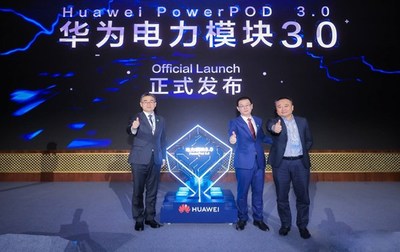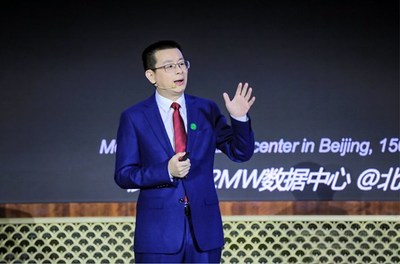During the Huawei Next-Generation Data Center Facility launch event, Fei Zhenfu, CTO of Huawei Data Center Facility Team, released a new generation of power supply solution—PowerPOD 3.0. Through core technology innovation and component convergence, the solution optimizes the layout and builds a worry-free data center power supply system that saves footprint, power, and time.
Footprint saving: 40% smaller footprint
By using an innovative converged architecture and the industry’s ultra-high-density UPS5000-H, the power density per cabinet is increased and the space layout of the power supply system is optimized. The number of cabinets is reduced from 22 to 11, resulting in a significant footprint decrease. In a 12 MW data center, for example, the footprint saved by the PowerPOD 3.0 solution allows for deploying more than 170 additional racks compared with a traditional power supply solution.
Power saving: 70% lower consumption
The link efficiency of a traditional power supply solution is generally lower than 94.5%. In contrast, PowerPOD 3.0 raises the efficiency up to 97.8% while shortening the link length. In addition, the UPS5000-H delivers an efficiency of 99.1% in S-ECO mode, effectively reducing power consumption. Using the PowerPOD 3.0 in a 12 MW data center will save nearly 300,000 U.S. dollars each year.
Time saving: 75% shorter delivery
A traditional power supply solution requires about 35 copper bars and 180 cables to be connected onsite, resulting in high-quality risks and a delivery period of 2 months. The PowerPOD 3.0 uses tray-alike prefabricated busbars for internal connections. With prefabrication and commissioning completed in the factory, onsite construction can be completed only in 2 weeks, accelerating service rollout for customers.
Worry free: 40% lower fault rate in SLA
Based on the concept of “autonomous driving” and AI technologies, the PowerPOD 3.0 is armed with iPower intelligent feature, which provides two-layer reliable designs for end-to-end visibility as well as AI temperature prediction, life prediction of key components, and intelligent setting. Automatic and predictive O&M becomes possible.
Data centers are evolving towards high density and large scale. As the “heart” of a data center, the power supply system must not only ensure safety and reliability throughout its life cycle to match the growth in demand, but also integrate all equipment in the power supply chain in an innovative way to create more value for customers.
Photo – https://mma.prnewswire.com/media/1826791/image_1.jpg
Photo – https://mma.prnewswire.com/media/1826792/2.jpg

